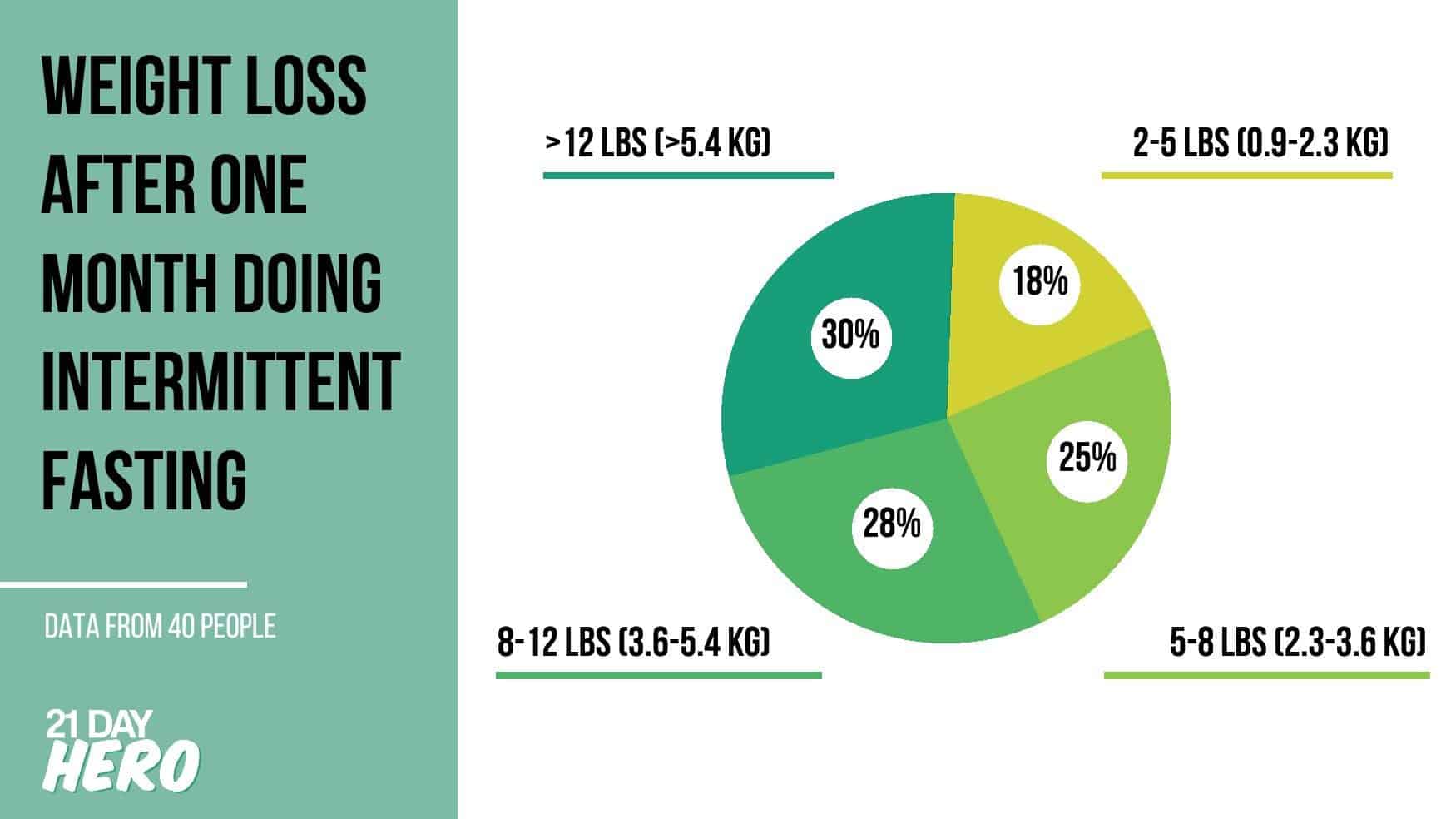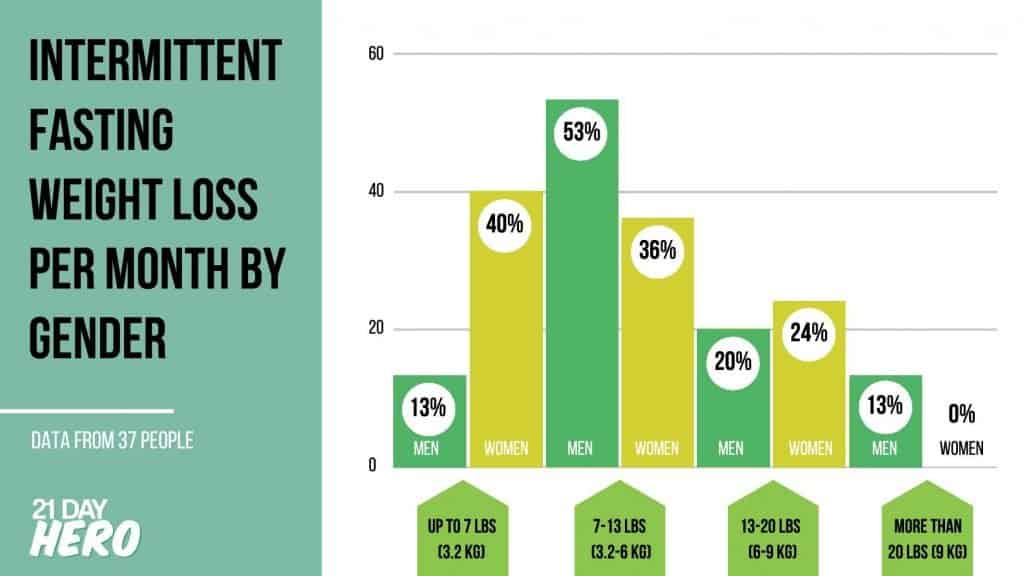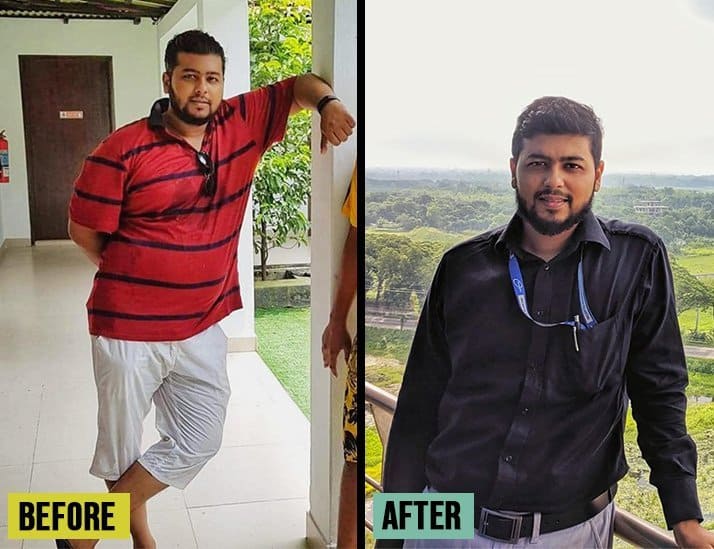What Intermittent Fasting Results Can You Expect?
Intermittent Fasting and weight loss | Other Results | Results after 1 month of fasting | before and after stories
There are so many articles on Intermittent Fasting benefits, different types of Fasting and tips on how to practice this lifestyle.
Yet, what about the actual Intermittent Fasting results?
How much weight can you lose with Intermittent Fasting and how long does it take to see results from Intermittent Fasting? What other benefits can you expect when embarking on your new fasting journey?
We interviewed over 30 people (men and women) to understand what Intermittent Fasting results they experienced and summarized the findings below in this blog post.
Spoiler Alert: the Intermittent Fasting results are so inspiring you’ll want to start straight away!

Intermittent fasting results and weight loss
Undeniably, the most common and also the most desired intermittent fasting result is weight loss.
Many diets promise rapid results but often lead to yo-yo effect, when after a tough period, dieters end up back where they started or heavier than before. Intermittent fasting is a great way to reach a sustainable weight loss – not only lose but also maintain the desired weight, as confirmed by most Intermittent Fasters that have done our Intermittent Fasting Challenge.
So how come Intermittent Fasting is more sustainable than other diets?
The key to sustainable weight loss is being consistent and making your ‘new diet’ a lifestyle rather than doing it temporarily. For many people, Intermittent Fasting allows this given they can still enjoy their favorite meals time from time, as long they adjust the eating schedule.
For our 21-day Intermittent Fasting Challenge, we suggest starting with a 12/12 fasting schedule, gradually increasing it to 16/8 fasting (click to learn more): a 16-hour fasting and an 8-hour eating window. Taking small steps allows your body (and mind) to adapt to the new eating pattern slowly. It has proven to be the most effective if your goal is to make intermittent fasting a long term habit.
How much weight can you lose doing intermittent fasting?
Are you ready for some numbers?
First, let’s look at what the research says about intermittent fasting weight loss results.
In a 2015 review pooling 40 different studies, participants who did intermittent fasting shed on average 10 pounds in a 10-week period. Another study found that obese adults following an “alternate day” intermittent fasting schedule (eating 25 percent of their daily calories on one day, and eating normally the following day) lost up to 13 pounds (6 kg) over 8 weeks.
Intermittent fasting also succeeds where many weight-loss regimes fail: by targeting and reducing visceral fat. Visceral fat is the stubborn, internal fat packed deep around your abdominal organs. During a period of six months, people on an intermittent fasting diet were able to shed 4-7% of their visceral fat.
Sounds great, doesn’t it? But what about the real-life experiences?
Average weight loss after one month doing intermittent fasting
For our Intermittent Fasting survey, we started with a question: “How much weight can you lose in 1 month with Intermittent fasting 16/8?”.
Turns out over half (58%) of intermittent fasting beginners lost around at least 8 pounds (3.6 kg) after 1 month of intermittent fasting and 30% reached at least 12 pounds (5.4 kg) weight loss.
Intermittent Fasting Results 1 month:

Average Intermittent fasting weight loss per month by gender
Curious to know whether there are any differences between intermittent fasting results for men and women?
Our survey shows that men reach slightly higher intermittent fasting weight loss results.
Women doing intermittent fasting mostly lose up to 7 pounds (3.2 kg) weight while more than half of men reach 7-13 pounds (3.2-6 kg) weight loss during the first month.
13% of men even report 20 lbs (9 kg) or higher weight loss in their first intermittent fasting month.

Intermittent fasting weight loss per month by age
When it comes to age, looks like you might be more likely to reach better intermittent fasting results if you are within the age range of 42-48.
In this age group, the average weight loss for intermittent fasting beginners was 20 pounds (9 kg) after the first month of fasting.

Other intermittent fasting results
While weight loss is by no doubt the most desirable Intermittent Fasting result among most of the people who have started our Intermittent Fasting Challenge, it’s not the only benefit you can expect from fasting.
When we asked people to name other positive changes they have noticed after starting with Intermittent Fasting, we saw several other great benefits.
The most common benefit of intermittent fasting turns out to be increased energy levels.
How come less food leads to increased energy? This could be contributed to your body not using the energy to digest food and/or having to think what you should eat next.
People have also experienced multiple other benefits like improved metabolism and immune system, more mental clarity and better sleep.

Intermittent fasting for weight loss. Before and after
Now when we have all the numbers and statistics down, let’s take a look at some real-life examples of intermittent fasting results, and before and after photos.
Here are 4 people who were open to share their Intermittent Fasting results and answer the questions you as a beginner might have: “How long does it take to see results from intermittent fasting and how much weight you can lose with intermittent fasting?”
Gigi Ghobrial
WEIGHT LOST: 52 lbs (23.5 kg)
TIME: 7 months

“My transformation was Intermittent Fasting combined with going to the gym. I lost a total of 52 lbs in 7 months.
I started with Intermittent Fasting and transitioned to one meal a day (OMAD) over time. Occasionally I would also do extended fasting. I love the flexibility of being able to enjoy life by eating well. It’s not so much what I eat anymore, it’s when I eat that’s important. Fasting changed my life, specifically my relationship with food!”
Want to learn more about OMAD (One-Meal-A-Day) Fasting? Start with our 21-Day OMAD Fasting Challenge straight away!
Dionna Lofton
WEIGHT LOST: 86 lbs (39 kg)
TIME: 6 months

“In six months (from Jan 1 (top left photo) to mid-June (bottom right photo) I went from 223 lbs to 147 lbs, from size 20 pants to size 6 and from size 3XL shirts to L shirts. A few months later, I’m at 137lbs and proudly wear a medium/size 6!
On weekdays I normally do 18/6 fasting – eat between 11:30 am and 5:30 pm. During this journey, I learned to eat healthier and stay away from breads pasta and fatty salad dressings.
Sometimes during weekends, I would do a water fasting – no food from 5:30 pm on Friday until 11:30 am Monday morning. During this time I would have black coffee with cinnamon and loads of water.
Besides all the weight loss, I got so much more energy now! I’m now running in competitions and coming in first, whereas before I couldn’t even walk without panting. I’m off my heart medication now and can do all these great things now, despite my epilepsy. I feel like nothing can stop me now!”
Tanzilur Rahman Tonmoy
WEIGHT LOST: 59 lbs (26.8 kg)
TIME: 13 months

“It’s about 13 months since I started my health journey with Intermittent Fasting and until this day have lost a total 59 lbs, and went from 236 lbs to 177 lbs. I don’t even want to go back to my unhealthy lifestyle again.
I started slowly then increased day by day, adding no sugar and Keto diet to my Intermittent Fasting lifestyle. My secret to weight loss is all the above + huge determination and patience.”
Combining Keto and Intermittent Fasting has proven great results not just for Tanzilur. Want to try this magical combo yourself, gain muscles and lose fat? Sign up to your 21-Day Keto Intermittent Fasting Challenge here.
Grace Richards
WEIGHT LOST: 25 lbs (11.3 kg)
TIME: 4 months

“I have lost 25 pounds in 4 months with Intermittent Fasting and 1 hr of walking a day. I normally do 18/6 Intermittent Fasting – start eating at 12 in the afternoon and have my last meal at 6 pm. Then I fast from 6 pm to 12 noon the next day.
I had great results with Intermittent Fasting and always encourage everyone to try it out. Exercise was a big part of my weight loss journey, too – I try to reach 10’000 steps every day and eat a very clean diet.”
Top 8 Benefits Of Intermittent Fasting
1. Helps In Weight Loss
We covered this in detail in this article. Obesity is a major health concern, and the focus of most diets is to achieve fat burn. Abstinence of food allows you to use the stored fat for energy. Intermittent fasting is an excellent strategy for weight loss and also has some independent health benefits. Eating for a set period of time makes you eat fewer calories. Intermittent fasting boosts your metabolism and shows promising results on fat loss and insulin sensitivity.

A study published in the International Journal of Obesity indicated that intermittent fasting leads to considerable weight loss in obese men.
When we stop snacking between meals, our insulin levels go down. This facilitates the release of stored sugar from fat cells leading to weight loss. Intermittent fasting influences your hormone function; it lowers insulin level, enhances growth hormones and norepinephrine, which facilitates fat burning. It also increases the metabolic rate, thus helping you lose weight.
2. Improves Your Hormone Functions

During your fasting period, various changes take place in your body. The changes in hormonal function initiate cellular repair and healing of your body.
Intermittent fasting mainly affects these hormones;
One of the most significant benefit of intermittent fasting is lowering insulin levels. When you consume food, it increases your calorie levels resulting in the release of insulin. The most effective way of lowering insulin is to avoid food, exactly what intermittent fasting does during the fasting window. Lowered insulin means more fat is burned.
Growth hormone enhances the breakdown and utilization of fat by reducing both lipoprotein lipase activity and insulin’s inhibitory action on hormone-sensitive lipase. It also preserves muscle protein, muscle mass, and bone density.
According to studies, fasting enhances growth hormone secretion, which helps to preserve the muscles as well as burn fat.
- Brain-Derived Neurotrophic Factor (BDNF)
Dietary restriction in intermittent fasting decreases energy consumption without compromising any nutritional value. It brings some powerful changes in the metabolic processes of the brain by increasing stress resistance, breaking down fats and ketogenic amino acids. With neuroprotective effect, BDNF helps in the generation of new nerve cells, enhances cognitive functions and learning.
Intermittent fasting increases the production of BDNF, leading to the prevention of dysfunction and dysregulation of neurons.
3. Reduces The Risk Of Type 2 Diabetes
Many health professionals recommend dietary interventions for managing diabetes.
A diet regimen that lowers insulin resistance and blood sugar levels can be beneficial in type 2 diabetes. Intermittent fasting improves morning fasting glucose levels and reduces postprandial variability.
Intermittent fasting is a simple and accessible nutrition intervention. It results in significant improvements in diabetic glucose control. According to experts, it is a safe and tolerable diet for diabetic patients that results in zero incidences of hypoglycemia. It often leads to weight loss by reducing caloric consumption, which is beneficial for many people with type 2 diabetes.
4. Improves Heart Health
Intermittent fasting is a calorie restriction diet that reduces body weight and improves various cardiovascular risk factors. It is believed to lower blood pressure, insulin resistance and increase heart rate variability. Studies have indicated that when the frequency of eating is reduced, it results in better cardiovascular stress adaptation. This lowers cardiovascular risk factors.
Alternate day fasting reduces age-related inflammation and fibrosis. Intermittent fasting guards your heart against ischemic injury and helps in recovering post-myocardial infarction (MI) via anti-inflammatory mechanisms.

5. Delays Aging Process
Oxidative stress is the primary cause of certain chronic diseases and aging. Intermittent fasting improves your body’s resistance to oxidative stress and helps fight inflammation.
Calorie restriction reduces the release of growth factors like growth hormone and insulin. This reduces the accelerating aging process and mortality in many. Intermittent fasting allows your body to repair cells and DNA, thereby improving health and longevity. Also, reducing chronic inflammation, intermittent fasting helps people live with a better quality of life.
6. Triggers Autophagy
Diet interventions promote metabolic and cellular changes resulting in adaptation to periods of limited nutrient availability. This nutrient starvation activates autophagy. The term “autophagy” means “self-eating,” where damaged and unwanted cells are eaten up by the body.
Autophagy plays a vital role in tumor suppression; hence it is associated with the prevention of cancer. It optimizes your body’s functioning by creating new cells and removing disintegrated ones.
7. May Prevent Cancer
Periodic fasting has a powerful anti-cancer effect. Cancer cells are vulnerable to nutrient deprivation and are significantly dependent on certain metabolites. Fasting brings alteration in growth factors and metabolite levels. Fasting creates an environment where cancer cells lose their ability to adapt and survive. According to research studies, fasting also improves the effects of cancer therapy and reduces the side effects of the treatment.
Glucose is the fuel for most cells, including cancer cells. Fasting leads to a glucose-depleted state that stops or alters this growth. Intermittent fasting also enhances your immune cells making them more effective against cancer cells.

8. Helps You Sleep Deeper
If you are struggling with sleep issues, eating close to bedtime can be one of the reasons. When you follow a regular eating pattern, your body gets adapted to a consistent sleep schedule. By building a strong circadian rhythm, intermittent fasting helps you sleep better and deeper.
A pilot study has revealed that periods of fasting promote sleep quality and reduce nighttime awakening. The study also indicated that fasting increased daytime performance.
Want to shine with your own Intermittent Fasting results?
Join our 21-Day Intermittent Fasting Challenge and see your weight dropping & energy increasing day by day!
It has never been easier before to finally make Intermittent Fasting a sustainable lifestyle that will make you healthy, fit and happy again!
Want to learn more about the types of fasting and what you should do?
Make it a great year! I recommend starting here to learn more about these types of fasting which are the MOST popular, most beneficial for you, starting with 16/8 Fasting, click on these below to learn more:
16/8 Fasting Guide, 14/10 Fasting Guide, 18/6 Fasting Guide, One Meal a Day Guide
Also need help fasting? Check out these 6 top mobile apps we recommend to help you on your journey: See the apps by clicking HERE.
Want to go on a Fasting or Health retreat with likeminded others? Check out our Fasting Retreats review page Here.


